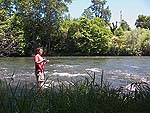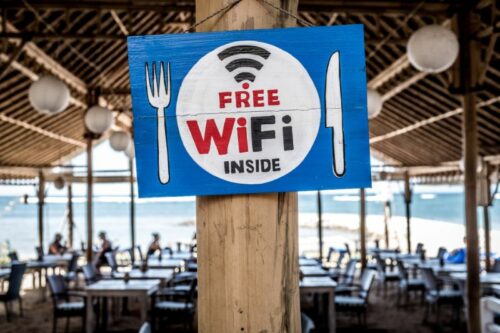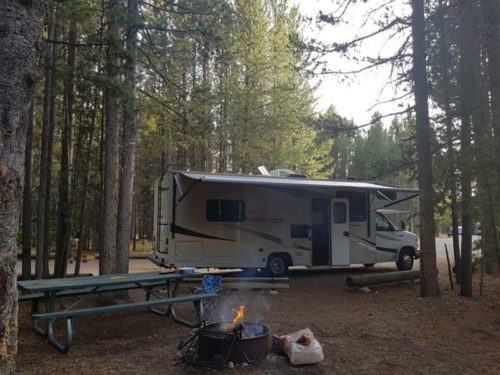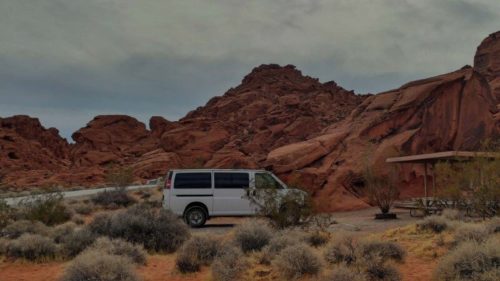Our new life as [an error occurred while processing this directive]s brought me an unexpected challenge—getting a good night’s sleep. Being a very light sleeper, [an error occurred while processing this directive] life has cost me many restless nights and prompted me to seek out a solution.
In our previous fixed foundation home, disturbances had been fewer and my sleep more restful. On the other hand, [an error occurred while processing this directive] living exposes the occupants to more disturbances due to the lighter construction and the surroundings. Having lived in our [an error occurred while processing this directive] for over a year, I have found solutions for reducing some of the disturbances which have kept me up at night.
NOISE
By far, the most disruptive are the various noises surrounding the RV lifestyle. The most common noises that RVers have to deal with are:
Truck stop & rest stop noises
Both are convenient locations to pull into for the night when other facilities are not necessary. Truck and rest stops are popular with the RV community because they are free and provide quick access to the highway. Unlike campgrounds, these venues have no quiet hours and nothing separates your RV from semi trucks on both sides. I would think that few individuals can sleep through the noise of 600 horsepower diesels pulling in and out during the night. The best you can hope for is that the trucks on either side of you are staying for the night, supplying a constant idling noise, which you can get accustomed to.
Highway noises
Another favorite of many RVers on the move is the easy on, easy off RV park. Their proximity to the highway is desirable for getting back on the road quickly, but this same proximity brings constant noise. Because we had to remain within commuting distance of the city, our first RV park for six months was next to a busy highway. In a few weeks I became accustomed to the steady murmur of tires, but occasional loud vehicles continued to wake me.
RV park noises
Living around RV’s means being around large vehicles, many of them with loud diesel engines. Even the most courteous RV operator will occasionally have to arrive late or leave very early; RV setup and movement causes noise, no matter how careful one is about minimizing it. An inconsiderate operator compounds the problem by making no effort at being quiet.
Inconsiderate neighbors
While I find the large majority of RV dwellers to be very considerate of others, one bad camper can ruin the night. Talking near other RV’s, laughing, TV and radio noises, yelling at the game on TV, allowing dogs to bark, are common nighttime problems in closely packed campgrounds. Be aware that moderate TV and radio noises can be heard next door, especially if doors or windows are open. Chatting quietly next to a neighbor’s bedroom window can be enough to wake a light sleeper.
Weather noises
One of the loudest noises inside an RV is heavy rain or sleet hitting the roof. Fortunately, this is an infrequent occurrence and should only be an occasional bother. On the other hand, a gentle shower has a relaxing sound that lulls me to sleep.
Nature noises
As often as we can, my wife and I seek out serene settings such as state and national parks. These parks usually offer spacious campgrounds where artificial noises are rarely heard. As much as I enjoy listening to nature sounds while awake, irregular noises wake me. These noises vary from crickets, hooting owls, howling coyotes, singing frogs, and any number of things that stir in the dark. After being accustomed to noisier environments, even the deep silence between nature sounds can make it difficult to fall asleep.
Have you experienced this yet: You pull into a large slot in a beautiful state park. Enormous trees are shading the lot, providing a pleasant sitting place with a lake view. The setting is gorgeous in every way—the perfect place to relax for the weekend. At night you fall asleep quickly, surrounded by complete darkness and the sound of trees swaying in the gentle breeze. Then, BANG! No, that was not a shotgun, it was the horse apple tree shedding its fruit on the roof of your motor home, shaken loose by the midnight gusts. As you are woken repeatedly by random bangs, you pray for the wind to die down.
Fortunately, many sounds can be masked by constant noise, or “white noise”, to minimize their disruptive effects on sleep.
Here are several ways to reduce disruptive noises in an RV:
- Earplugs
I find that earplugs block out a great amount of noise, but are uncomfortable to sleep with. The upside is that they are inexpensive, easy to carry, and require no electricity. - Running the fan on the air conditioning unit
Ours has a pretty loud fan, ideal to mask the sounds of noisy neighbors and moderate rain. - Dehumidifier
Even if humidity is not a problem, we usually run it for the humming noise it produces. It is not nearly as loud as the air conditioning fan, so it is ideal for less noisy campgrounds. - Stand-alone fan
The hum of a standard desk of floor fan placed close to the bed is also a great source of masking noise. - Sound machine
Also called sound conditioners, these are electronic acoustic devices that emit a variety of noises such as waves, rushing water, gentle rain, simple white noise, etc. Battery operated sound machines are ideal so they may be used while not plugged into power.
Some of the loudest noises can not be masked and must be dealt with in other ways. For example, there is not much you can do about truck stop noises or objects falling from a tree above. The solution for these noises is to limit your exposure. It may be worth stopping one night in a noisy rest stop, but plan the next night in a quieter setting so you don’t deprive yourself of restful sleep for too long.
LIGHT
Bright lights are another source of disturbance for the light sleeper. Common sources of bright lights are from light poles, lights from neighboring RV’s, and vehicle headlights. Sunlight can also be an issue for those who need to sleep during daylight.
The day and night shades found in many RV’s are inadequate to sufficiently block out bright lights. If the factory shades or blinds are not adequate to darken the bedroom, invest in one of the various devices designed to seal windows and roof vents. Thick towels or manila folders attached to the shades will block out a good amount of light and are good temporary solutions.
RV MOVEMENT
Even the best stabilized RV’s will have some movement or vibration. The lighter the RV, the more movement can be felt. It amazes me what small effort is required to shake a heavy trailer. Our fifteen pound Schnauzer can shake our 17,000 lbs trailer just by jumping down from the sofa.
Common sources of RV movement:
- People and pets moving inside RV
- Strong winds, especially if awnings are deployed
The solution to minimizing movement is to level and stabilize the RV as well as possible. In windy conditions, stow all awnings to reduce surface area. In addition to the stabilizer jacks that came with the recreational vehicle, consider add-on options such as under-the-frame jacks, king pin stabilizers, tire locking chocks, etc. No matter how many products are used, some movement will exist in the RV and will take getting used to.
To be clear, the sleep disturbances discussed in this article are not necessarily constant nor problematic enough to cause loss of sleep every night. Much of it depends on the surroundings and personal habits of the occupants. Is this issue significant enough to cause me to reconsider the RV fulltimer lifestyle? Not even close, but worth considering if you are interested in joining the adventure.
Original founder and writer for Changin' Gears. Former full-time RVer!
-
Charlie Kerekeshttps://changingears.com/author/charlie-kerekes/
-
Charlie Kerekeshttps://changingears.com/author/charlie-kerekes/
-
Charlie Kerekeshttps://changingears.com/author/charlie-kerekes/
-
Charlie Kerekeshttps://changingears.com/author/charlie-kerekes/










